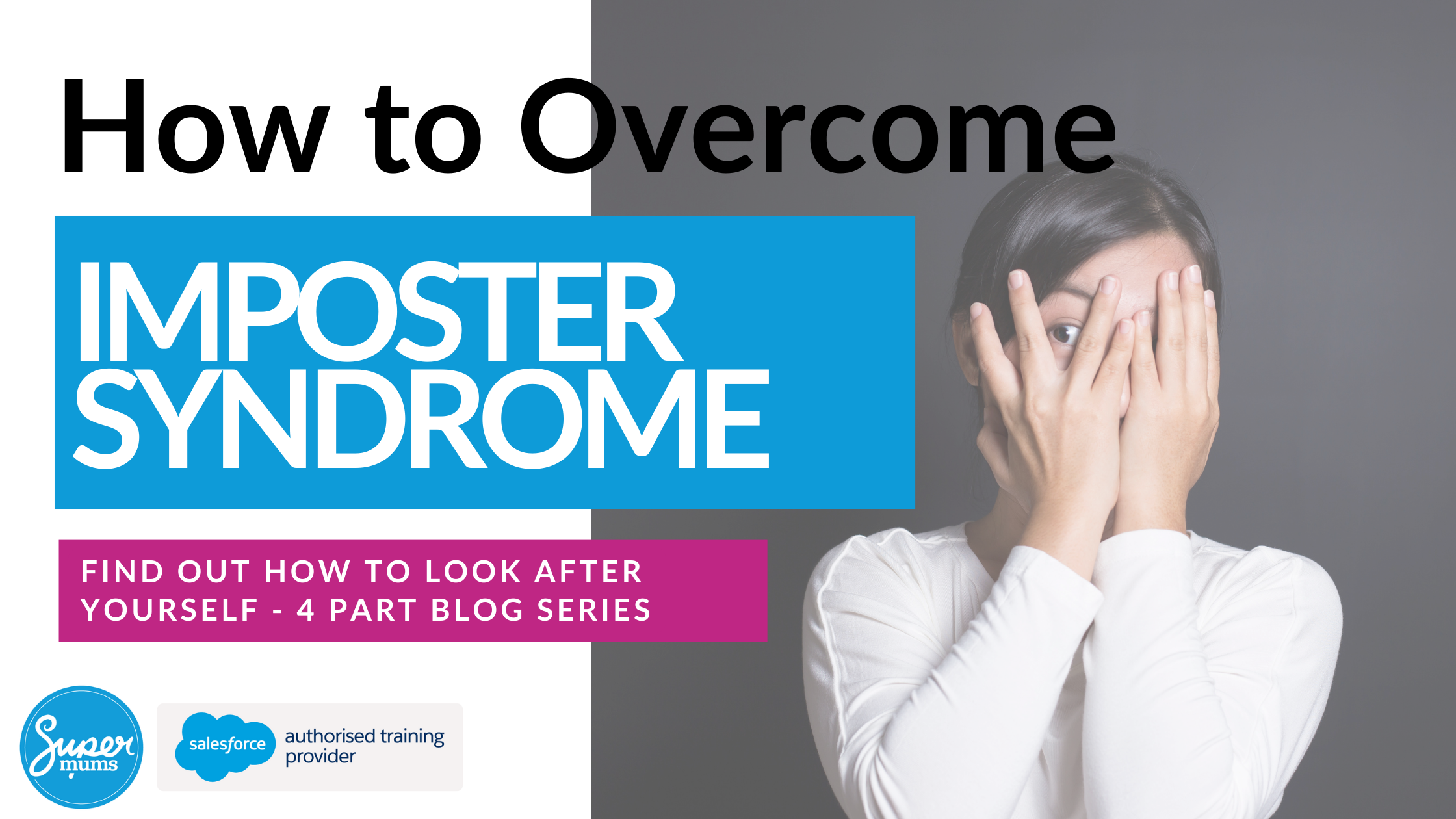Imposter Syndrome: How to overcome it and embrace your worth
By Heather Black

Over the next four weeks we are talking about burnout, anxiety, imposter syndrome and overwhelm, and sharing strategies on how to maintain positive mental health & wellbeing whilst launching and building your career alongside juggling personal and family life.
We are sharing strategies on:
- Part 1: How to prevent burn-out
- Part 2: How to reduce anxiety
- Part 3: How to overcome imposter syndrome
- Part 4: How to manage overwhelm
Sign up to our Weekly Career Boost Bulletin to stay up to date and get notified when each of the strategies are shared.
Also, get 5% off any of our Salesforce courses when you subscribe to our newsletter.

If you are returning to the workplace after a career break, launching into a new career or stepping into a new job role / promotion, you might experience anxiety or imposter syndrome.
If you are finding yourself working long hours, you are struggling to manage your own time or you are taking on too much as you are not able to say no to things, then you might be feeling a sense of overwhelm or burn-out.
In today’s world we can juggle a lot and we have to learn to self-manage our mind, our time, our ambitions and our boundaries. Working on our mental health and feeling in control of our life is really important to maintain momentum.
At Supermums, we are passionate about the power of coaching to help improve mindset and mental health. We have a team of career coaches that work with people launching and furthering their Salesforce career as they go through these emotional challenges.
If you are based in the UK the coaching support could be funded subject to eligibility.
Find out more about one to one coaching support here or join our Ambitious Women Mindset Summit to learn some coaching tools and techniques for free.



Marie Hannigan
Kelly Nash
Christina McLoughlin
How to overcome Imposter Syndrome
Imposter syndrome is a pervasive phenomenon that affects individuals across various fields and stages of life. Despite external evidence of competence, those experiencing imposter syndrome constantly doubt their abilities and fear being exposed as frauds. In this comprehensive guide, we’ll delve into what imposter syndrome is, how to diagnose it, why it happens, and provide actionable steps to overcome it and thrive in your endeavors.
What is Imposter Syndrome?
Imposter syndrome refers to a psychological pattern where individuals doubt their accomplishments and have a persistent fear of being exposed as frauds, despite evidence of success. People with imposter syndrome often attribute their achievements to luck or external factors rather than their own abilities, leading to feelings of inadequacy and self-doubt.
Diagnosing Imposter Syndrome:
Recognizing the signs of imposter syndrome is the first step in addressing it effectively. Some common indicators include:
- Feeling like a fraud, even in the face of evidence of competence or success.
- Downplaying accomplishments or attributing them to luck or external factors.
- Fear of being “found out” or exposed as incompetent.
- Setting excessively high standards for oneself and feeling like nothing is ever good enough.
- Constantly seeking validation or approval from others to validate one’s worth.
Why Does Imposter Syndrome Happen?
Imposter syndrome can stem from various factors, including:
- Perfectionism: Individuals with perfectionistic tendencies often set unrealistically high standards for themselves and feel like failures if they fall short of these standards.
- Comparison: Constantly comparing oneself to others and feeling inadequate in comparison can fuel imposter syndrome. Social media and the prevalence of highlight reels can exacerbate these feelings of inadequacy.
- Childhood Experiences: Early experiences of criticism or pressure to excel can contribute to the development of imposter syndrome later in life. Messages received during childhood about achievement and self-worth can have a lasting impact on self-perception.
- Workplace Culture: Toxic work environments that foster competition, comparison, and unrealistic expectations can exacerbate imposter syndrome among employees.
Overcoming Imposter Syndrome: Actionable Steps
While overcoming imposter syndrome may require time and effort, there are practical strategies individuals can implement to challenge self-doubt and embrace their worth:
- Acknowledge Your Achievements: Make a list of your accomplishments, big and small, and celebrate them. Recognize that your successes are a result of your skills, effort, and perseverance, not just luck or external factors.
- Reframe Negative Thoughts: Challenge negative self-talk and replace it with more realistic and empowering statements. Instead of focusing on what you haven’t accomplished, remind yourself of your strengths, skills, and past successes.
- Embrace Failure as Growth: Shift your perspective on failure from a sign of incompetence to an opportunity for growth and learning. View setbacks as valuable lessons that can help you improve and succeed in the future.
- Set Realistic Goals: Avoid setting impossibly high standards for yourself and instead set realistic, achievable goals. Break larger goals down into smaller, manageable steps, and celebrate your progress along the way.
- Practice Self-Compassion: Treat yourself with kindness and compassion, especially during moments of self-doubt or failure. Remember that everyone experiences setbacks and challenges, and it’s okay to ask for help or take breaks when needed.
- Seek Support: Surround yourself with supportive friends, family members, mentors, or colleagues who can provide encouragement and perspective. Share your feelings of self-doubt and imposter syndrome with trusted individuals who can offer support and reassurance.
- Focus on Growth, Not Perfection: Shift your focus from achieving perfection to continuous growth and improvement. Embrace the journey of learning and development, and celebrate progress rather than perfection.
What should YOU do next?
Imposter syndrome is a common experience that can undermine confidence and hinder personal and professional growth. By recognizing the signs of imposter syndrome, understanding its underlying causes, and implementing practical strategies to challenge self-doubt, individuals can overcome imposter syndrome and realize their full potential. Remember, you are worthy of success and capable of achieving your goals. With self-awareness, self-compassion, and perseverance, you can conquer imposter syndrome and thrive in your endeavors.
Learn Coaching Tools
Join us for our Ambitious Women Mindset Summit to learn different coaching tools and techniques to improve your mindset.
Talk to us
Find out more about career coaching, and how it can support you by booking in a free consultation with our career coaches at Supermums.
Written By:
Subscribe To Our Weekly Top Tip Bulletin
Get Updates And Learn From The Best













